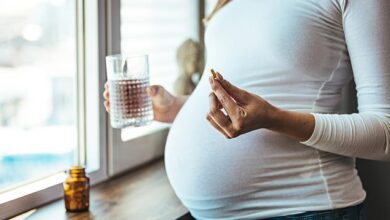Lauren felt a searing pain shoot through her body after drinking a gin and tonic, but put it down to a pulled muscle at the gym. Then a doctor told her the terrible news




Lauren Gill was drinking white wine while catching up with friends after work when she felt a searing pain shoot through her neck and shoulders.
‘It started on the right side of my neck and quickly spread to my right fingertips, like pins and needles,’ says Lauren, 30, a podcast presenter from St Albans, Hertfordshire.
“I had spent a lot of time at the gym, so I assumed I had pulled a muscle.”
The pain went away after 20 minutes, so Lauren stayed for a few more drinks and forgot all about it.
But a week later she went to a bar for a gin and tonic and the same thing happened again.

Lauren Gill, 30, discovered she had Hodgkin’s lymphoma, a form of cancer that affects the white blood cells that fight infections, after experiencing pain in her neck and shoulders from drinking alcohol
“It was horrible: one minute I was chatting to my boyfriend and the next minute I was in total pain,” says Lauren.
‘This time I only had a few sips before I started having severe pins and needles all over the right side of my body, from my neck and shoulders to my hands, which lasted for about 20 minutes – and then mysteriously disappeared.’
Lauren continued to experience similar pain down the right side of her body every time she drank even a few sips of an alcoholic beverage.
“I still thought it was gym pain,” she says. In fact, the true cause was more sinister: Lauren had Hodgkin’s lymphoma, a form of cancer that attacks lymphocytes, white blood cells that fight infections.
The cancer causes them to multiply faster than normal and then settle in glands called lymph nodes, which are found throughout the body, and develop into tumors. The first sign of Hodgkin’s lymphoma is often swollen glands in the neck, armpit or groin, but some patients also develop a reaction to alcohol.
That had happened in Lauren’s case, but she had no idea that her reaction was a sign of something serious. She simply started avoiding alcohol.
Then, on Christmas Eve 2018, a few months after her initial reaction, Lauren went to visit a friend, who offered her a festive Baileys.
“I hadn’t had a drink in six weeks and I thought I’d try a little shot and see what would happen,” says Lauren.
She took a sip and immediately felt a severe pain in her right arm and shoulder. “It was the worst reaction I’ve ever had,” she recalls.
‘I only had a tiny amount left and my arm went numb. It was really scary.’
The reaction was so severe that she went to her GP, who referred her for blood tests.

About one in twenty of those who experience symptoms associated with Hodgkin’s lymphoma will experience alcohol-related symptoms
Lauren was shocked to learn that her white blood cell counts were “three times what they should be, which showed they were in overdrive and battling something serious,” she says.
The severity was revealed in March 2019, when Lauren was referred for a chest scan after coughing so badly she could barely speak.
This showed that she had two masses in the center of her chest, near her right lung.
A subsequent biopsy confirmed they were tumors and doctors told Lauren she had stage 4 Hodgkin’s lymphoma.
“I burst into tears, it was all such a shock and out of nowhere,” says Lauren. ‘I was only 25 and hadn’t even felt that ill, apart from the coughing and the reaction to alcohol – and now I was told I had cancer. I felt completely numb.’
Around 2,000 people are diagnosed with Hodgkin’s lymphoma in Britain every year, and it is most common in people aged between 15 and 35, says Dr Graham Collins, haematologist and head of lymphoma at Oxford University Hospitals NHS Foundation Trust.
Anyone who has had glandular fever and people with a reduced immune system, for example due to autoimmune diseases, are slightly more at risk.
Cases are increasing, but while much work has been done to find out why, “there is virtually nothing to show for it,” says Dr. Collins. “We just don’t know.”
While tumors often lodge in the lymph nodes in the neck, armpits, and groin, they can also occur in lymph nodes elsewhere in the body, such as the chest or abdomen.
Here the glands cannot be felt, but instead tumors can cause symptoms when they press on tissue or surrounding organs. Patients may experience shortness of breath, coughing (as Lauren had), abdominal pain or a very full feeling in the abdomen after meals.
And about one in 20 of those affected will experience alcohol-related symptoms, says Dr. Collins.
One theory is that “when a lymph node is affected by lymphoma, the outer capsule is stretched somewhat,” he adds.
‘When you drink alcohol, the blood vessels in the body dilate and this can cause the capsule around the lymph node to stretch further and more suddenly, causing pain.
“It can be a dull ache or even a sharper pain, which usually occurs 30 to 60 minutes after drinking alcohol,” says Dr. Collins. ‘It can occur anywhere there are lymph nodes, for example under the arms, in the neck or in the chest.’
Another symptom is weight loss and drenching sweats, says Dr. Collins. “The lymphoma cells that develop in the lymphocytes can release chemicals called cytokines,” he says. ‘These can cause inflammation and fever and when the fever breaks out we start to sweat.’

Lauren says she didn’t drink much alcohol before her diagnosis and now only drinks on special occasions – opting to go to the gym instead of the bar
Hodgkin’s lymphoma can be treated with intensive chemotherapy and sometimes radiotherapy.
But as with all cancers, the sooner it is caught, the better.
Sadly, around 500 people still die from lymphoma in the UK every year, of which around 300 are under the age of 25.
After her diagnosis, Lauren was told she would need chemotherapy, but she delayed treatment for two weeks so she could have her eggs frozen, as she was warned the cancer drugs could harm her fertility.
She then received three months of intensive chemotherapy.
“It was really hard going through chemotherapy while all my friends continued to live their lives normally and have fun,” says Lauren.
‘When you’re diagnosed with cancer you expect everyone else’s lives to stop too, but they carried on while I was in a sheltered bubble in hospital getting my treatment. It was a really tough and scary time and my hair was falling out, which was devastating.”
Lauren completed chemo in July 2019. She had to go to the hospital for tests every three months, but was told in May 2022 that she was officially in remission.
“I was so emotional when I got the deal and I cried a lot of happy tears,” she says. “It was such a huge relief.”
She has now started a podcast, F The Noise, to share her cancer journey. “I want others to understand that a strange reaction to alcohol can be an early symptom,” says Lauren.
‘It took me a while to go to the doctor because I had no idea about this rare and subtle symptom – and by then it had spread from my chest to my lungs.’
Many other people have contacted Lauren since she shared her story, “saying they had experienced the same thing.”
She says: ‘I didn’t drink much alcohol before and now I only drink on special occasions. I go to the gym instead of the bar.
‘The treatment has slightly damaged my immune system, making me susceptible to illness. It means I’m more careful when I go to crowded places and I wear a face mask on the subway.”
The experience changed Lauren’s outlook on life. She now works for herself so she can take a break when she needs more rest, and prioritizes her health.
“I don’t drive as fast as I used to,” she says.
‘If you have cancer, you really have to set new priorities.’




